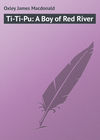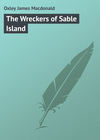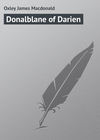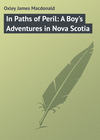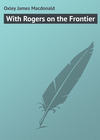Buch lesen: «Ti-Ti-Pu: A Boy of Red River», Seite 2
CHAPTER III
A Cold Plunge
Hector had all but reached the pine. In fact, one more stride would have brought him to its trunk, when his right foot slipped upon one of the outspreading roots, hidden under a carpet of smooth brown needles, and he pitched forward, narrowly escaping striking his head against the massive trunk.
He was little hurt by the fall, but he was very much dazed, and the bear might have had him in its deadly hug ere he could have recovered himself, had not a new actor appeared upon the scene. The boats had come to a halt to rest the men just about the time that Hector ran off after the dogs, and Andrew Macrae, noting the boy's disappearance, snatched up a gun and climbed the river-bank to see what had become of him.
'He's na here,' he exclaimed in surprise, as he stood looking all about him. 'Where can the feckless bairn ha' gone to?'
Just then his keen ears, trained not to miss the slightest sound, caught faintly the sharp barking of the two dogs. 'Eh! eh!' he muttered. 'They've started up some creature – maybe a squirrel or the like. I'll just run and see what they're doing.'
So, gun in hand, he set off at a long easy lope that was little slower than a horse's trot. As the barking came more strongly to his ears, he realized that something serious was taking place, and quickened his pace, until he had reached the limit of his powers.
But a few minutes of such exertion were required to bring him to the scene of action, and swinging around the pine tree, he arrived at the very crisis of his son's peril.
Throwing the gun to his shoulder, and not waiting to take careful aim, he fired just as the great black brute reared to strike at Hector. The whole charge of heavy buckshot took effect full in the bear's breast, and down he pitched almost upon Hector, but incapable of further harm.
Mr. Macrae's feelings were so mixed that he hardly knew how to express himself. He had been angry with Hector for straying away from the river-bank, but now he was naturally hugely proud of his own success as a bear killer, and this rose superior to his anger. Raising Hector to his feet, he said, mildly enough: 'Ye didna heed ma word, laddie,' and then added with swelling voice, 'eh, but it's a grand creature! Rin now to the boat, and tell the men to come and help me with it. I canna carry it back alone.'
Relieved beyond expression at his escape from the bear, and from his father's deserved reproof, Hector darted off, and presently returned with several of the men, who were all greatly interested in the big game Andrew Macrae had bagged.
Andrew was anxious that his 'gude wife' should see his noble prize, before it was skinned, and so he persuaded the men to help him take it down to the river.
The little party made quite a triumphal procession, with Hector proudly leading the way, the four strong men bending beneath the weight of their trophy, and the two dogs frisking and barking about them, evidently quite aware of the important part they had played in the business.
Of course, Hector's mother both scolded and coddled him, and little Ailie gazed with startled eyes at the motionless monster, and Dour and Dandy came in for unlimited praise and patting, which they accepted with their wonted dignity. Among the boatmen were those who knew exactly what to do with the bear, which was in superb condition, and the splendid skin having been carefully removed, the best part of the meat was saved to provide juicy steaks and cutlets for the travellers' table.
From the Hayes River, the boats turned into the Stool, and then into the Fox River, and later into the Hill River, which was the most rapid of all, and very difficult to work up against its opposing currents.
One of the worst places was Rock Portage, where the river, pent in by a range of small islands, formed several cascades, none of which could be ascended by the laden boats. It was, therefore, necessary to take out all the cargo, portage it across one of the islands, and then, by dint of tremendous toil, drag the big boat across the island, and launch it again above the cascade.
This sort of thing went on day after day, until at last, to the infinite relief of the tired toilers, they reached Oxford House, an important post of the Hudson's Bay Company, where a rest of several days was allowed for them to recuperate.
During all this toilsome progress, Hector never had a dull moment. He helped whenever he could, and when not required for this, found plenty to occupy his attention. He was the best of brothers to Ailie, taking her to play upon the bank, picking flowers for her, and pointing out the birds in the trees, and the tiny creatures that rustled through the dry grass. Often his mother would join in these little rambles, and then Hector's happiness was complete. He felt himself the man of the party, and assumed an air of importance that greatly tickled his shrewd, fond mother.
The halt at Oxford House was enjoyed by everybody. Here both ducks and trout were to be had in plenty and most of the men went either shooting or fishing. Andrew Macrae preferred the former, and, having succeeded in securing the loan of a canoe, with a half-breed to paddle it, took Hector off with him for a day's sport.
The weather was favourable, and Cross-Eye, the half-breed, who got the name from his eyes being on the bias, promised them plenty of ducks. They paddled up the lake for several miles until they came to a kind of enclosed bay, whose shores were lined with a thick growth of underbrush.
'In there we go,' said Cross-Eye, in his queer guttural tone, and the canoe was directed to a good landing-place. 'Hide him,' grunted the half-breed, and the light craft was lifted out of the water, and concealed among the trees.
They next proceeded to put themselves out of sight, there to patiently wait the appearance of the ducks. Mr. Macrae and Cross-Eye settled down comfortably. Not so Hector. He had absolutely nothing to do but search the sky for the black specks that would grow into the toothsome birds they sought, and, as none of these were visible, he naturally grew restless. He fired questions at Cross-Eye, in spite of the taciturn half-breed's surly responses, and he bothered his father with proposals to do this or that, none of which were approved.
At last he gave a cry of delight, at the same moment that Cross-Eye grunted in a relieved way. Far to the west, a thin black line showed faintly above the horizon, and rapidly grew more distinct. The ducks were coming at last.
Crouching close to the ground, and hardly breathing in their excitement, the three hunters awaited their approach. When the orderly array of winged voyageurs had come within reach of the sound, Cross-Eye proceeded to imitate their cries with a marvellous fidelity.
Hector was amazed at the sounds which issued from him. They were so perfectly bird-like.
Instead of flying over, the ducks hesitated, returned the cries that attracted their attention, and then, with much flapping of wings, dropped down upon the still surface of the little bay, right in front of their hidden enemy. The moment they were well within range, at a signal from Cross-Eye, the report of two guns rang out like one, and two ducks gave their last quack.
With wonderful quickness the half-breed had the canoe launched, but Hector was no less quick in springing into it, and off they went after the birds. A few powerful strokes brought them to where they lay upon the water.
'You get them,' grunted Cross-Eye, as he held the canoe steady, and Hector leaned over the side to pick up the ducks. It was not a difficult thing to do, but the sudden excitement after the wearisome waiting had flustered him. He was so eager to do his share of the work that he overdid it, and upset the canoe, throwing the half-breed and himself into the water.
Now there was nothing of the hero in Cross-Eye. He was both angry with Hector for his awkwardness, and alarmed about his own safety. So, without one thought of the boy, he made for the shore as fast as he could, in spite of Mr. Macrae's indignant appeals to him to help Hector.
As for the latter, he had not been born and bred beside a Scottish loch without learning to swim. Indeed, neither Dour nor Dandy could get faster through the water. But the ice-cold lake into which he had been so suddenly plunged was a different thing from the sunny loch in summer-time.
Before he had taken a dozen strokes towards the shore, the deadly chill laid hold upon him, and numbed his arms and legs until he could scarce keep his head above water. Indeed it did go under once, the water smothering the cry for help that his peril had wrung from him, ere his father, throwing off his coat, plunged in to his rescue.
CHAPTER IV
Hector Entrapped
Before Mr. Macrae had reached Hector, he, too, felt the paralysing effect of the glacial water. But he was a man of enormous strength, and, wallowing through it like a whale, grasped the boy firmly with his left hand, while he struck out for the canoe, which rocked upon the water in supreme indifference to their struggles for life.
'Keep up, laddie, keep up,' he panted. 'I'll get ye safe ashore.' Reaching the canoe, he drew down the side until Hector could seize it with his stiffening hands. 'Noo, then, laddie, ye'll just haud on there, and I'll push the thing to the land.'
Hector held on with the strength that his terror gave him, and Mr. Macrae, grasping the canoe at the other side, pushed it through the water with all his might.
In this fashion they made the shore, where Cross-Eye stood shivering and glowering at them. Mr. Macrae's first impulse was to warm his skin pretty thoroughly for his cowardly desertion of the boy. But before his hand fell, he checked himself, saying: 'Ye feckless loon! – ye ken nae better, nae doubt. Yer only thought was for yer ainsel'. Well, we'll say nae mair. Come, let's make a fire and dry our things.'
The half-breed, who had evidently expected some rough usage, looked immensely relieved at the quick turn of affairs, and set himself to the building of a big blaze, with such skill and energy, that the chilled duck-hunters were presently basking in its welcome warmth.
As soon as their clothes were dried, they recovered the ducks, which were still floating on the water, and then hid themselves to await another flock. Their patience was rewarded by the securing of some half-dozen more. Then, feeling well content with the day's bag, they paddled back to Oxford House.
A few days later, the boats resumed their journey, crossing Holey Lake, ascending a little river to Hell Gate – a very difficult place to pass – and so on by way of Echenamis, and Sea River, and across the Play Green Lakes, to Norway House at the north end of Lake Winnipeg.
Here all difficulties with rocks and rapids ended – the exhausting labours of the portage were over. With broad sails hoisted to the wind, the big boats ploughed through the turbid waters of the shallow lake, traversing it from north to south, and without any mishap, reached the end of their voyage. The colonists, heartily weary of being cooped up in the boats so long, were only too glad to be put out upon the solid land.
They were now actually in the Red River country, for which they had ventured so much, and it was with eager, anxious eyes that they looked about them.
The Red River itself constituted the central feature of the landscape. Having its source in the elevated land some hundreds of miles away, it flowed in a muddy, sluggish fashion into Lake Winnipeg. On its west side the country was one boundless level plain of rich, deep loam, whose fertility would presently amaze the newcomers, accustomed to the grudging, niggardly soil of their native land. On the east the scene was more varied with hill and dale, and skirted at no great distance by what were called the pine hills, covered with timber, and running parallel to the river all the way.
'The gude God be thankit!' ejaculated Andrew Macrae, as his keen gray eyes surveyed the fair prospect, all glowing beneath the splendour of an unclouded sky, and, removing his bonnet, he offered a brief yet fervent thanksgiving. 'Eh! but it's a fine land!' he continued. 'Why, ye scarce can see a stane on it, and where there are sae mony flowers, there'll be nae lack o' fat crops in the comin' year.'
Thus speaking, Andrew gave voice to the first impression of all the men, while the women, with glad eyes, noted the soft beauty of the country, and said to one another that it was a bonnie place, and they were glad they had come to it.
As for the children, they could hardly contain themselves. The thick, soft grass in which they could roll and tumble without let or hindrance was a pure delight to them. Oh, what a romp they and the dogs did have! and how heartily Hector and Ailie entered into the merriment!
There were somewhat primitive carts to carry the heavy baggage, but the colonists all had to walk; and it was, consequently, at no hurried rate of progress, that they moved southward to their final destination.
It was in the beginning of October that the weary, travel-worn colonists, with their families and possessions, reached the tract of land beside the Red River which their lordly patron had selected for their settlement.
Their very first proceeding was to gather together and offer thanks to God, for His providential care of them through all the perils of the long journey. Never before had the clear sweet air of the prairie been stirred by the strains of sacred song, and, as the solemn beautiful music of the Psalms rose heavenward, there hurried to the wondrous novelty a motley crowd of fur hunters, half-breeds, and Indians, who remained to listen in gaping curiosity, if not in reverent appreciation, to Andrew Macrae's dignified reading from 'the Book,' and to the lengthy prayers that followed from other men of the party.
The instant the praise service was concluded, Hector, accompanied by Dour and Dandy, started out to inspect their new home. The boy was in high spirits, which his four-footed friends shared. At least, Dandy did, for he frisked and barked with great vim, thereby attracting the attention of the suspicious, snarling curs that belonged to the residents, who had never seen so handsome a member of their race before. Dour bore himself with more dignity, yet it was evident that he understood that they had arrived at the end of their tiresome travelling, and that he rejoiced thereat.
Naturally Hector turned his steps towards the fort, which was the most conspicuous feature of the scene. This did not belong to the Hudson's Bay Company, but to their bitter rivals, the North-West Fur Company, and, had the boy only known, was the stronghold of those who were to give the settlers many miserable days.
It was not a very imposing affair, simply a stout stockade in the form of a square, having one gate protected by short towers, and enclosing a cluster of buildings, only one storey in height, built in the same rough fashion.
Hector, drawing near the gate, which stood wide open, looked curiously in. The whole thing was entirely novel to him, and, boy-like, he greatly longed to understand it. Dour and Dandy, feeling ill at ease now, kept very close to him. They did not altogether like the look of things, and would have preferred retracing their steps, but of course they had not the slightest notion of deserting their young master.
As Hector stood hesitating, a young man, coming from the interior, beckoned to him in a friendly fashion, saying: 'You want come in. All right, you come.' He was clearly a half-breed, and had a dark, evil face that was far from prepossessing.
Hector instinctively disliked him, but could not very well refuse his invitation, even though the shrewd collies sniffed so suspiciously at his legs that the fellow shrank away lest they should bite him. 'Nice place, eh?' he asked, with a sly ingratiating smile. 'Plenty good furs in there,' and he pointed, with a very dirty finger, to the largest of the buildings. 'You stranger, yes? Come I show you the store.'
Hector had a premonition of trouble, but was not sufficiently strong-minded to beat a retreat, as he should have done. The half-breed certainly seemed courteous, even if the expression of his face were sinister.
Following his guide, the lad entered the trade-house, which contained the goods used in bartering with the Indians for their furs, and was astonished at the quantity and variety of the stock displayed. Here were guns, pistols, knives, hatchets, blankets, shirts, caps, mitts, tobacco, tea, sugar, smoked and salted meats, handkerchiefs, sashes, snowshoes, moccasins, coats and trousers, and so on, piled upon the floor according to a rude, but no doubt effective system.
'Plenty goods here, eh?' said the half breed, with a crafty leer, as if his object were to arouse the boy's envy. 'Company very rich – very strong – have many forts all about' – and with a sweep of his arms he indicated a wide stretch of territory. Hector certainly was much impressed by what he saw, and felt free to say so, whereat his guide seemed much gratified.
'Come now see furs – oh! fine furs!' he cried, and, taking hold of Hector's arm, led him off to another building, even more solidly built than the trade-house. A single door was both the means of admittance and of lighting the place. Inside were ranged bales of furs, the pelts of marten, mink, otter, bear, fox, wolf, and beaver, which had been trapped by Indians and half-breeds in far-away places, and brought in to exchange for the goods they coveted.
Some of the skins were loose, and the half-breed drew Hector's attention to a particularly fine blue fox, which he explained was worth 'heap money.' Hector was examining this, passing his hand over the soft, rich fur, when suddenly he was tripped and thrown upon the floor by his scoundrelly guide, who, before the boy could regain his feet, dashed out of the door and slammed it shut, setting the great bar across it.
In perfect darkness and bewilderment, Hector picked himself up. Can you blame the poor lad if his first feeling was something very like panic-stricken terror? He had been taken so completely by surprise, and felt so utterly helpless. Through the thick door, he could hear the angry barking of Dour and Dandy, who were evidently defending themselves against assailants of some kind, and he shouted with all his might: 'Help! Help! Let me out! Let me out!'
